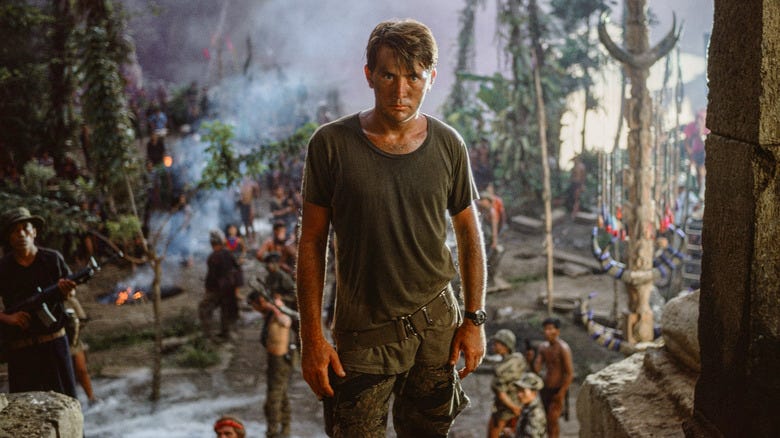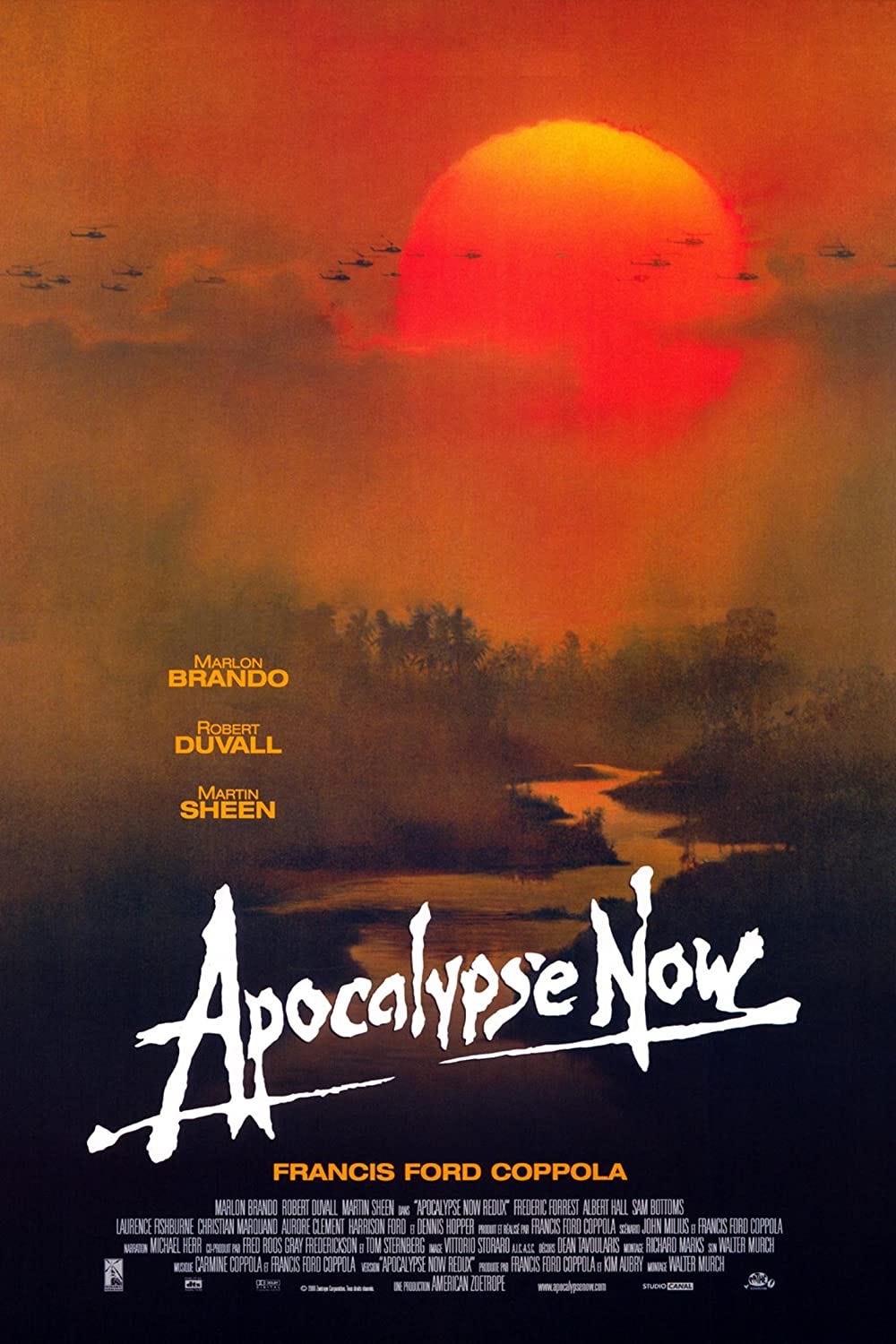For two decades now, Apocalypse Now has been my favorite film.
Whenever it comes up as a prompt, I know I could give more thorough, descriptive reasoning for this choice. I could speak to the epic scope, spanning well over three hours in its extended cut. I could mention my fascination with the Vietnam War and how this film captures some of the most intangible qualities of that quagmire—the confusion, the desperation, the displaced camaraderie, the gallows humor. I could speak to the craft itself, from the writing to the performances to the cinematography to Francis Ford Coppola’s remarkable command of the entire production.
But rather than speaking to why I love this film or what I love about it, I always choose instead to talk about how I saw it for the first time—and who showed it to me.
My high school English teacher, Mrs. Lynn McGuffey, is the teacher who made the biggest impact on me.1 She wasn’t the warmest teacher. Or the most fun. And certainly not the easiest.2 But she was a legend at Homewood High School for the way she could level with her students without putting up with any of their nonsense. She’d kick your ass with her red pen and you’d thank her for the privilege. She was one of those teachers.3
We really ran the gamut in Mrs. McGuffey’s AP English class, from Greek mythology to modern novels. One of the most significant texts we covered in our fall semester was Heart of Darkness, Joseph Conrad’s classic interrogation of European colonialism within the narrative framework of a dreadful adventure tale. It’s only 100 pages or so, but as I recall (having only read it the once), it’s so rich that it commands, well, several class periods of discussion, at the very least.
It’s not the easiest text to study. So how do you contemporize a century-old novel for a group of 17-year-olds? You show them the movie, of course. Especially if that movie does a brilliant job of contemporizing the novel by placing the story in the middle of an intercontinental war.
If you’ve seen the film, you know that herein lies a challenge. Apocalypse Now is very much rated R for all kinds of reasons, and you can’t exactly show R-rated films in a high school classroom, even though there’d be nothing stopping the students from renting or going to see such a film after the final bell rings.
This is where Mrs. McGuffey separated herself from the rest of the faculty pack.
Mrs. McGuffey’s students read and discussed Heart of Darkness every November. So she would host a school-sanctioned “Christmas party” for her AP English students every December at her home—where she would secretly show them Apocalypse Now.4
Maybe it was the added knowledge of the plot and themes of the novel that activated our brains that night. Maybe it was the group setting, taking in a celebrated film with more than a dozen of my friends and peers, all for the first time. Maybe it was Mrs. McGuffey’s hosting and curating, sharing something she loves with numerous young minds.5 But Apocalypse Now blew me away, and continues to do so every time I see it—especially when I share it with others myself.
I didn’t keep up with Mrs. McGuffey as much as I should’ve over the years. I occasionally ran into her at an annual authors conference at a local library. The last time I saw her there, she smiled and returned my greeting, but I could tell that she didn’t remember me well. But that was okay, seeing as I’ll never forget her.
Mrs. McGuffey passed away in late June after nearly two years of battling health issues while in hospice care. Sadly, I wasn’t able to attend the funeral because it overlapped with an appointment with my cardiologist. (I think she would’ve called this symbolism.) But it warmed my heart (which is fine, by the way) to know that so many of my classmates were there, whether in body or in spirit. Because I know she stayed with us long after our graduation.
Folks like to say “call your mom” or “call your dad,” but reader, call your teachers too. Especially if they showed you R-rated movies at discreet holiday gatherings.
Apocalypse Now Redux is now streaming on Hoopla, and it’s available to rent elsewhere. Apocalypse Now and Apocalypse Now: Final Cut are also available to rent.
I had her two of my four years, in fact. She taught Honors English to freshmen and AP English to seniors, and I took both of those classes.
We had to do a college-equivalent research paper for our final project in AP English. I wrote about three of Ernest Hemingway’s novels, and she gave me a B-. Needless to say, I didn’t ace that class, but she sure as hell taught me how to write a research paper. I never got a grade worse than that one on any of my research papers in college or graduate school.
Another thing I really appreciated about Mrs. McGuffey: She always wore her church outfit to work on Monday because she thought it was silly to only wear it for a couple of hours. What a rich character detail.
I’ve always wondered if this was a sort of open secret at my high school. It’s very possible that the administrators knew Mrs. McGuffey was doing this, but she’d been there so long and proved to be so invaluable that they let her get away with it. (If this is not the case, and we students just did a killer job of keeping our mouths shut, then shouts out to us.)
Another thing about that night I’ll never forget: Mrs. McGuffey’s husband was a Vietnam veteran, so every time she had her covert Christmas party, he would say hello to us and then promptly leave the room because he simply couldn’t risk the trigger of PTSD from the film. It wasn’t the guns or the bombs or the screams. It was the sound of helicopter blades that he couldn’t bear.




I prefer the cut version, but I fully understand why people like the Redux as it extends the madness their going towards, the idea that civilisation is slowly slipping away the farther they go up river and there's nothing they can do to stop it and in some cases, Willard's, want to stop it. He wants to see what's at the end, to face it and see who comes out the victor. The two scenes that stick out for me are Lt. Col. Kilgore saying 'Some day this wars gonna end.' The contrasting look on his face, resignation and Willard's face, your insane, was an epic moment of film making and the edit of the scene ending right there was genius. The other, the bridge a Do Lung when Willard asks 'Hey solder, who's in charge here?' 'Ain't you!' Those two lines encapsulate the entire war from the macro perspective. A damming indictment of Washington and the generals running that disaster.
The documentary "Hearts of Darkness" that Coppola's wife made about the production is incredible. Also, I remember having to read three novels by the same author for McGuffey's AP English class and then write a term paper examining common themes threaded throughout each book. She was tough, but I really enjoyed her class.